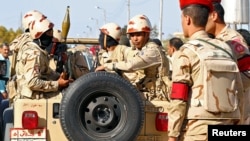As Egypt is cracking down on militants across the country, particularly in the country’s Sinai region, some experts and rights groups have voiced concerns that the country’s security forces are using counterterror measures to target dissidents.
“Three-per-day forced disappearances where individuals will simply be removed from their homes without any information given about their whereabouts and whether or not they even end up in the prison system where their lawyers are not able to access them to be able to discuss terms of their charges or to prepare for a trial,” Allison McManus, an analyst at Washington-based Tahrir Institute for Middle East Policy, told VOA.
Egyptian security forces have been fighting militant groups, particularly Islamic State, that have been operating in parts of the country for several years. But last year’s explosion that killed more than 300 people at a mosque in northern Sinai Peninsula marked a turning point in how the country dealt with militants.
President Abdel-Fattah el-Sissi ordered the country’s security forces to eliminate the threat of militant groups and clear them from the Sinai.
In February, the country's military planned a series of operations against militants in the Sinai region and also in parts of the Nile Delta and Western Desert.
“The armed forces call upon the Egyptian people in all parts of the country to closely cooperate with law enforcement forces to confront terrorism, uproot it, and immediately report any elements threatening the security and stability of the country,” military spokesman Col.Tamer al-Rifai said in a televised address in February.
Abuses
Amid the ongoing crackdown on militants, some rights groups accuse the Sissi government of abusing the country’s counterterrorism laws to deprive citizens of basic human rights.
“The Egyptian regime used its fight on terrorism to crack down on peaceful opposition and to shut down the public sphere completely,” Amr Magdi, a researcher at Human Rights Watch, told VOA.
Global rights group International Service for Human Right also leveled accusations at the Egyptian government for relying on torture, arbitrary detention, and enforced disappearances as a tool to silence and incarcerate its critics.
Dr. Imad Harb, director of research and analysis at Arab Center Washington, D.C., told VOA that Egypt has a duty to protect the rights of every citizen, as well as the rights of those suspected and convicted.
Egypt’s stance
Officials at Egypt’s Ministry of Foreign Affairs and the country’s embassy in Washington, D.C., could not be reached for comment for this story.
However, Egyptian authorities have denied the accusations in the past and insisted that the country’s security forces have enforced the law to ensure the security of the state.
In 2015, Sameh Hassan Shoukry, Egypt’s minister of foreign affairs, said those accusing Egypt should respect what he called “the independence of Egyptian judiciary.”
He made those remarks in response to criticism against the country’s newly enacted anti-terrorism law.
Broad scope
Some experts charge that Egypt’s counterterrorism laws are very broad in scope and vague, which allow authorities to label any act that might contradict the government’s agenda an act of terror.
“This eventually enables the Egyptian regime to arbitrarily prohibit or criminalize activities without definition, make accusations of terrorism without legal restraint and transfer civilians to military courts,” McManus said.
McManus added that the laws are written in a way where the language is quite broad and vague, which gives a lot of leeway to ruling judges.
“Terrorism law in Egypt could allow for a range of nonviolent crimes to be tried as a crime of terrorism, including vandalism. Writing anti-state slogans could be considered as an act of terrorism,” McManus added.
Due process
Some detainees are allegedly being held in prisons without legal due process, which has also concerned rights groups.
Mohamed Sultan, an Egyptian-American who was arrested in 2013 in Egypt over his social media activities, told VOA that he and his father were arrested by authorities without a warrant.
“We were arrested. We were basically disappeared for around 48 hours. Then, the arrest warrant was issued two days later,” Sultan said. “Anyone who dares to criticize or oppose the regime’s narrative is being cracked down on,” he added.
Sultan said he was subjected to torture while in captivity and said he still has the scars from cigarette burns on the back of his neck, which remind him of the physical and psychological torture he endured in prison.
“The physical pain goes away, but the psychological pain stays with you," Sultan said. “I have done all of the proper therapy after such a traumatic experience, but I still have episodes, as I now suffer from post-traumatic stress disorder.”
McManus said that according to studies conducted by her organization, documented reports show that Egyptian authorities hold detainees without allowing them access to legal representation or a judge for 72 hours or more. Under such conditions, she said, detainees are most vulnerable to abuse and forced confessions.




